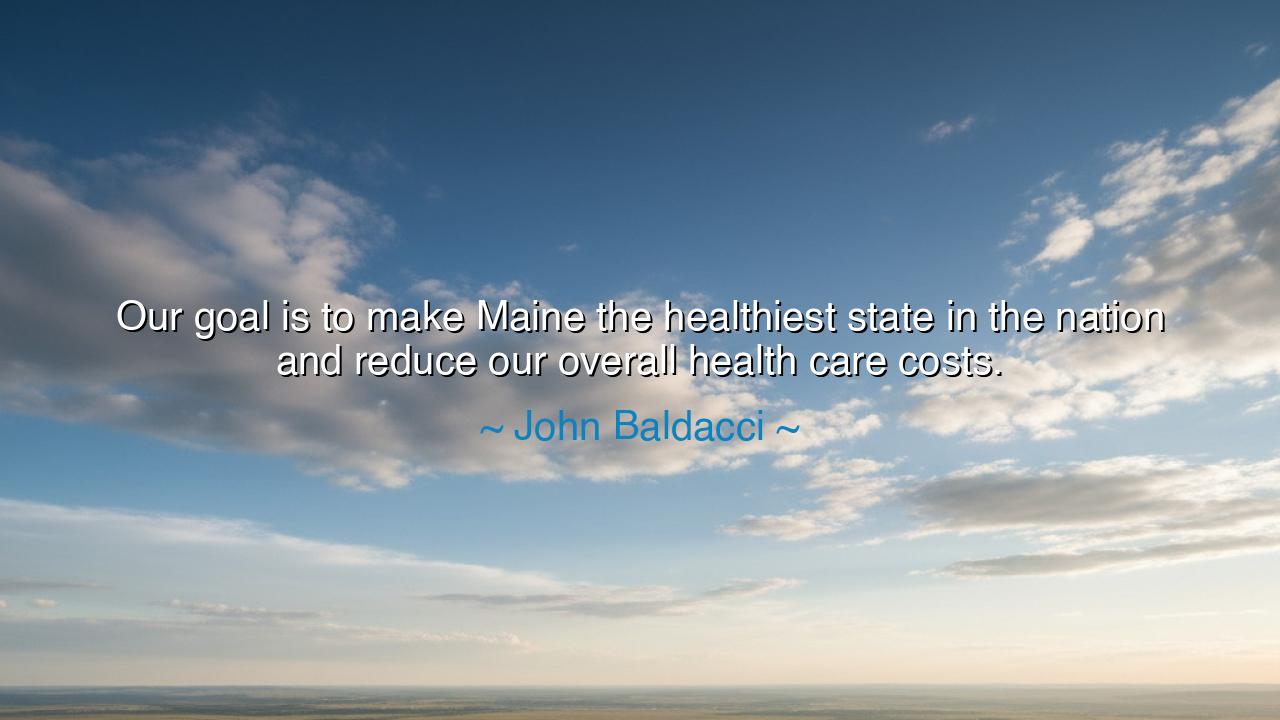
Our goal is to make Maine the healthiest state in the nation and
Our goal is to make Maine the healthiest state in the nation and reduce our overall health care costs.






“Our goal is to make Maine the healthiest state in the nation and reduce our overall health care costs.” — John Baldacci
Listen now to the words of John Baldacci, former leader of the state of Maine, who spoke not merely of policy, but of purpose. His statement is both practical and prophetic—a vision for the body and the soul of a people. When he declared that the goal was to make Maine the healthiest state, he did not speak of numbers alone, nor of statistics to be printed in ledgers. He spoke of a greater harmony—of the strength that comes when health, both physical and moral, becomes the shared treasure of a community. His vision was a call to wholeness, to heal not only individuals but the fabric of the state itself.
In the wisdom of the ancients, the health of a people was always the foundation of their greatness. The philosopher Plato taught that the body and the polis are one; as the citizens thrive, so does the city. And in the temples of Asclepius, the god of healing, people gathered not only to cure their sickness but to learn how to live rightly—through balance, moderation, and respect for the divine order. Baldacci’s words echo this old truth: that true prosperity is not found in wealth or conquest, but in well-being. For what good is a nation that grows rich while its people grow ill?
In his time as governor, Baldacci faced the burdens of a nation struggling under rising medical costs and unequal access to care. His call to reduce health care costs was not simply an economic demand, but a moral one. He saw that when illness spreads unchecked, it weakens more than bodies—it weakens hope, productivity, and community itself. The goal of health was thus not the ambition of one man, but the responsibility of all: to build a society where prevention triumphs over cure, where every citizen can breathe the air of dignity, and where medicine serves the people, not the powerful.
Consider the story of ancient Sparta, where the strength of the city was measured not in gold, but in vigor. From childhood, the Spartans trained their bodies and spirits for endurance, believing that a disciplined and healthy people could outlast any enemy. Though their methods were harsh, their lesson endures: the health of a people is their armor. Likewise, Maine’s vision under Baldacci sought not the might of armies but the quiet power of wellness—citizens whose minds were clear, whose bodies were strong, and whose hearts were bound together by shared purpose.
But health cannot be given by decree; it must be cultivated. No government can heal a people without their own participation. Just as the physician guides but does not breathe for the patient, so too does leadership inspire but not replace the will of its citizens. Baldacci’s dream of a “healthiest state” demands not only hospitals and policies, but daily acts of responsibility: the choice to walk instead of sit, to eat in moderation, to care for one’s neighbor, to breathe gratitude rather than complaint. The true cost of health is not money—it is mindfulness, discipline, and compassion.
The deeper meaning of his words reaches beyond Maine. They speak to every community, every nation that seeks to endure. The health of a people is the health of democracy itself. A sick population breeds despair, division, and dependence; a healthy one cultivates freedom, creativity, and joy. Thus, to strive for wellness is to protect the very soul of civilization. It is an act both humble and heroic—to strengthen the flesh so that the spirit may soar.
So, my children of tomorrow, take heed. The work of healing does not belong only to leaders or doctors, but to each of us. Keep your body in harmony with the earth that sustains it. Walk with purpose. Eat with reverence. Care for the poor, for their suffering diminishes all. Invest in prevention, for it is cheaper than despair. For as John Baldacci proclaimed, the goal is not only to reduce costs, but to lift a people—to build a land where health is not a privilege but a birthright, and where every heart beats in rhythm with the hope of the whole.
In this, you will find the wisdom of the ages fulfilled: that a nation made healthy in body and soul shall never truly fall.






AAdministratorAdministrator
Welcome, honored guests. Please leave a comment, we will respond soon